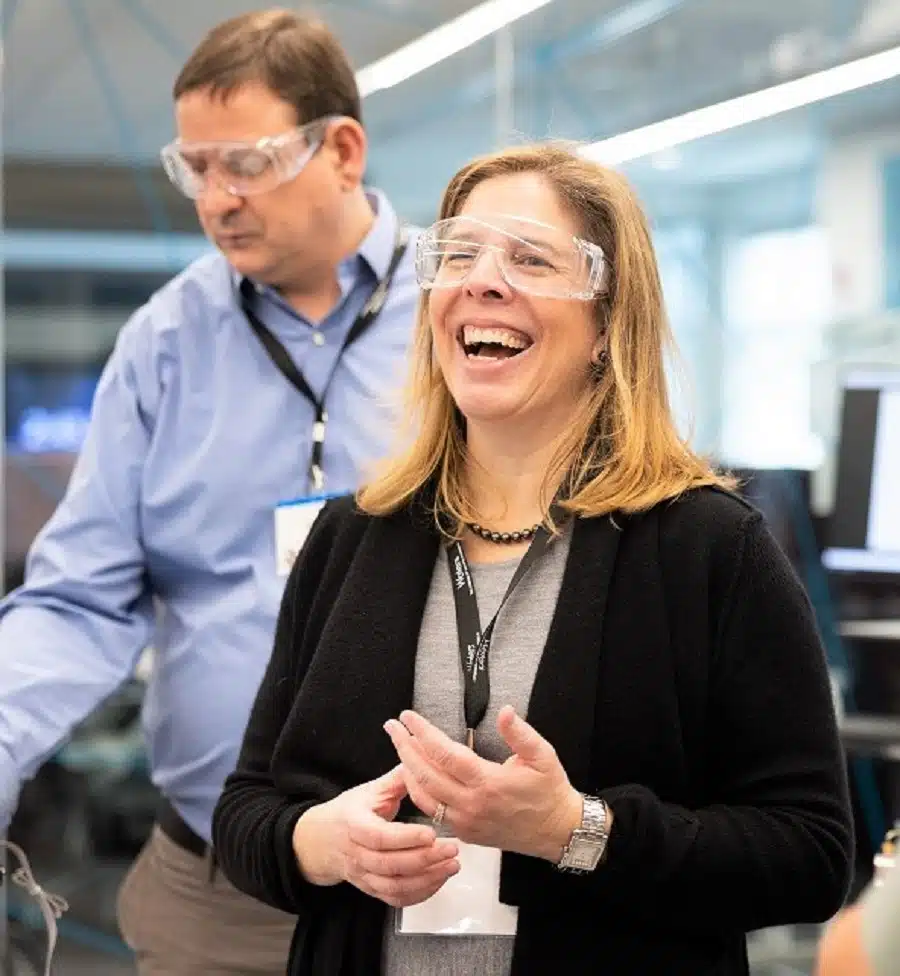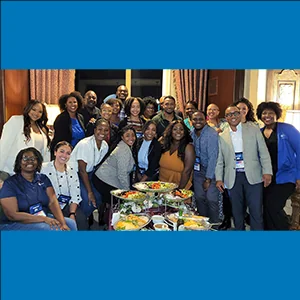Part of History: Building an Extraordinary Legacy Through a Passion for Science and Community

Walking through Kirkland Hall, the iconic and historic symbol of Vanderbilt University, one can’t help but notice the beautiful, striking portrait of a leader and pioneer for women of color in the sciences, Dr. Dorothy J. Wingfield Phillips. What you don’t see in this portrait is the amazing journey, rich with stories, deep-rooted values, and experiences of a woman of color growing up in Nashville in the 1950s, leading to a distinguished and celebrated career in the sciences.
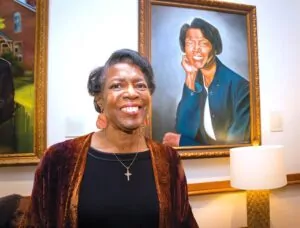
Dorothy holds the distinction of many firsts:
- First African American woman to receive an undergraduate degree from Vanderbilt University in the Arts and Sciences
- First African American woman to receive a PhD from the University of Cincinnati
- First African American woman on the Board of Directors of the American Chemical Society (ACS)
The journey wasn’t an easy one, and Dorothy credits her parents and upbringing for her perseverance, positive attitude, and tenacity to make a difference.
At Waters, Dorothy Developed Her Skillset, Took Risks, and Gained Valuable Experience
As a tremendous and influential advocate for STEM outreach, Dorothy joined Waters’ R&D team in 1984, bringing her large molecule expertise to the development of new and enabling separations technologies. With a background in biochemistry, Dorothy started her career at Dow Chemical in Midland, MI, receiving three patents. She spent the greater part of her career at Waters, moving from R&D to applied technology and then to marketing, and was promoted to Director for Global Strategic Marketing for our consumables division before retiring in 2013.
Last year, Dorothy returned to Waters as our keynote speaker as part of our Celebrating Diversity Month panel, sharing her experiences, the barriers she overcame, and her recommendations for STEM and Diversity, Equity, and Inclusion (DEI) outreach. Those who worked with Dorothy all note her positive attitude, innovative and strategic thinking, leadership, collaboration, and her dedication to mentoring other women and the next generation.
“Dorothy was a role model, a mentor, a sounding board, a friend to me in my early years at Waters. I was so impressed with her ability to tackle every situation with such an immense positive attitude – even when passions ran high! I always looked up to her because not only is she a great scientist and overcame so much adversity as a Black woman in science, but a wife, mother, grandmother,” according to Diane Diehl, Senior Director of Scientific Operations for Waters.
The Road Was Paved with the Support of Family, Faith, and Education as a Motivator
Dorothy credits her success, strength, and opportunities to her upbringing and her faith. She grew up in Nashville, TN during a time when the city was an active hub of the Civil Rights Movement. Her parents were very pro-education, and that resonated and was modeled throughout their household. “If we came home from school with no books, we would be handed a magazine to read instead.” It was very motivating for Dorothy to see her dad, who was a minister, return to the seminary to get his degree. “They thought it was very important to get educated as a tool to move forward,” Dorothy recalls.
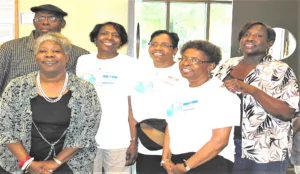
“Values were stressed, and sacrifices made…these things are just stuck in your mind and carry you through years later.” These were such important themes in the Wingfield household that Dorothy’s siblings and extended family are comprised of ministers and religious leaders, scientists, and teachers.
Dorothy’s family owned their home in Nashville, which was not the norm for many Black families at that time, and they played a key role in integrating their neighborhood. In 1956, 19th Avenue North was the defining crossroad for segregation, with Black families living on one side and white families on the other. Dorothy’s family was among the first to purchase a home on 22nd Avenue and Murphy Avenue, crossing those lines to the other side of 19th Ave. They were not welcomed by their neighbors, and in fact one family continued to call the police every time Dorothy and her siblings were outside without their parents, claiming they were disturbing the peace as they were playing. Eventually, more Black families moved in, some of the white families moved out, and the neighborhood was integrated – with a tremendous bond among the Black families that still endures 65 years later.
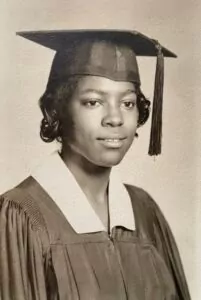
Dorothy always had big dreams as a child. She recalls playing in the yard and digging in the dirt, claiming at the time she was digging to China. “Later, I kept thinking of a brown girl digging in the dirt, never imagining I would actually go to China one day on a plane!” Indeed, Dorothy traveled internationally throughout her career with Waters and realized those dreams in her professional life.
Obstacles and Challenges Overcome by Personal Connections
Dorothy can’t talk about success and collaboration without speaking of the important influence and support of her late husband and high school sweetheart, James Phillips. After high school, they both went to Tennessee State University. Dorothy then transferred to Vanderbilt University, with a keen interest in pursuing the sciences and pre-medicine. This was not an easy transition. “It was very lonely; no one spoke with me or made an attempt to get to know me.” Unlike her life at Tennessee State, she didn’t have a community or support system on campus. She relied on her upbringing of faith, family, and demanding work.
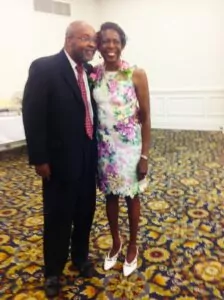
Dorothy and James joined Dow together in 1974, then moved to Waters where James was a well-respected technical support resource to our customers and our field teams. Having James by her side and as her biggest advocate enabled many opportunities, travel, and career growth.
Dorothy continually emphasizes the importance of communities, including Historically Black Colleges and Universities (HBCU) and organizations such as the National Organization for Professional Advancement of Black Chemists and Chemical Engineers (NOBCChE).
“These communities provide a sense of inner strength that young people often need to have to survive. They are a source of motivation, and the teachers know what is needed. I say that carefully, as integration was really great and made things more diffuse in serving the needs of the African American community.” Dorothy is a tremendous advocate of membership and involvement. “Make your network as broad and wide as possible,” she advises.
Persevering as a Black Woman in STEM
While at Dow, Dorothy recalls a story about a business trip that her boss discouraged her from taking. “I was the head person on the project and there was a meeting in Lake Jackson, TX. My boss didn’t think they would be receptive to a Black woman and discouraged me from going, trying to protect me.” But she wanted to be there, as the project lead, so was permitted to “go along.” Once there, her colleague fell ill, and she ended up having to be the key presenter. It turned out fine, and the Lake Jackson team was warm and accepting of her.
There were early challenges at the ACS as well, Dorothy describes, as it’s always been a very academic organization. “When I joined the ACS as an African American woman from industry, and not from the academic world, that was not an easy adjustment for some of my colleagues.” Dorothy’s goal was always to open minds. “It took time, prayer, patience, perseverance and hard work.”
A Collaborative Mindset and the Value of Mentorship
At Waters, Dorothy worked for the late and renowned Uwe Neue and right away understood the value and importance of mentors. She advises it’s important for companies like Waters to supply mentors and internships, and to support students coming out of HBCU’s. “They need to have support and someone who has their back to see them through.” She suggests STEM-based companies can take the lead in providing opportunities by finding new ways to motivate and engage students in STEM and by creating very focused programs. One current example of this is the Kory Morrow mentorship program.
Tom Walter, Corporate Fellow, Chemistry, worked closely with Dorothy for 25 years. “One thing I always admired was her ability to connect with people. Her warmth and genuineness, together with her intelligence and listening skills made conversations with her memorable. She had an extensive network of customers who she maintained contact with, and she would always make time to visit them. One of the ideas that came from a customer forum Dorothy planned on sample preparation became the Oasis microelution plate…one of the most differentiated products in our portfolio and one of our most consistently growing products.”
In 2008, Dorothy received the Waters Leadership Award. Her dedication, leadership, commitment, and passion for STEM have earned Dorothy widespread recognition outside of Waters as well. A few of her many awards include:
- Lifetime Achievement Award bestowed by NOBCChE in 2020
- Two named Dorothy J. Wingfield Phillips Chancellor Faculty Fellowships and an annual student Leadership Award from Vanderbilt University
- Recognized as a Vanderbilt Trailblazer in 2019, earning her an important distinction and the commissioned portrait hanging next to other VU Trailblazers
- Distinguished Alumni Award from the University of Cincinnati in 1994
In addition to serving as a long-time member of the ACS, Dorothy created opportunities for herself and others to engage with and learn from STEM professionals through her involvement in organizations such as the American Association for the Advancement of Science (AAAS) Science and Human Rights Coalition, its Steering Committee, and through her involvement in the . These experiences not only supplemented and enriched her academic and professional experiences, but they also propelled her into managerial positions that defined her career.
An Ethos of Bringing Other Women and Students of Color into STEM Fields
Dorothy was the chair of the ACS’s committee with responsibility for Diversity, Equity, Inclusion and Respect, advancing its commitment to inclusion in chemistry and initiating new outreach programs for students across all levels. Dorothy expressed, “We need to have a full body of organizations on board to get to young people. It takes both awareness and involvement. These partnerships and integration come from the top. You need a combination of funding agencies, the community, professional organizations, and industry.”
Dorothy continues, “A few people can make a difference, and then pass it on. It is about being active. The more people who are doing it, the wider the umbrella.” We are making progress.
The ACS just created its first chief operating officer (COO) position, naming LaTrease Garrison, a 30-year African American employee and graduate of Howard University (and a member of Dorothy’s sorority) as its inaugural COO.
Dorothy’s advice: “Be intentional about it. When there is a job opening, make it an effort to ensure you are searching across a diverse network for candidates.” She likes to refer to an analogy she borrowed, but strongly believes in: “Diversity is everyone’s responsibility. Safety is everyone’s responsibility. Just like safety, you need to take it seriously with intention and sincerity.”
Dorothy exemplifies what it takes to be an active contributor to science and to the communities in which we live and work. Mentor, inspiration, pioneer, leader, advocate. So many of us at Waters are also fortunate to call her our friend. Those of us who have worked with Dorothy have been positively influenced by her stellar example and values as a leader. Dorothy continues to inspire and embody our passion for STEM, and we continue to learn from her rich and unique perspectives to be more intentional with respect to diversity, equity, inclusion, support and outreach.
Additional Resources:
Blog: Black History Month: Honoring the Past, Focusing on the Future
Blog: Fostering an Inclusive Workplace, Where Diversity and Innovation Thrive
Diversity and Inclusion at Waters
Waters Corporation Corporate Social Responsibility Practices
Popular Topics
ACQUITY QDa (16) bioanalysis (11) biologics (14) biopharma (26) biopharmaceutical (36) biosimilars (11) biotherapeutics (16) case study (16) chromatography (14) data integrity (21) food analysis (12) HPLC (15) LC-MS (21) liquid chromatography (LC) (19) mass detection (15) mass spectrometry (MS) (54) method development (13) STEM (12)

